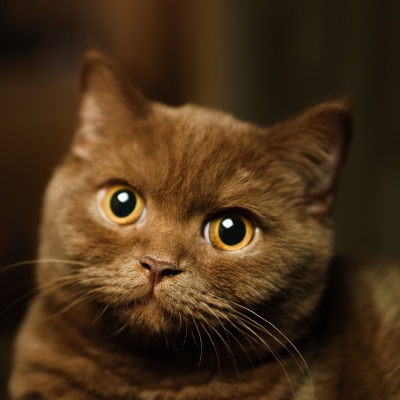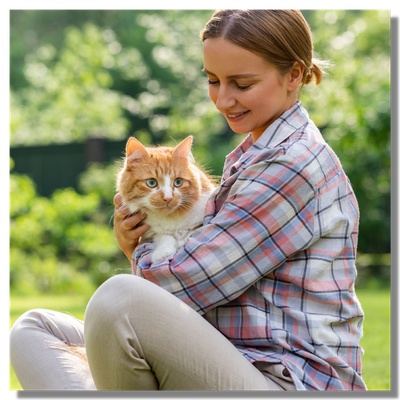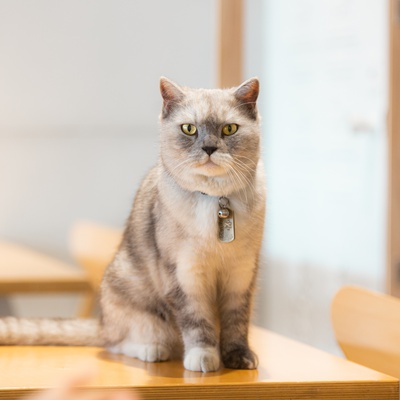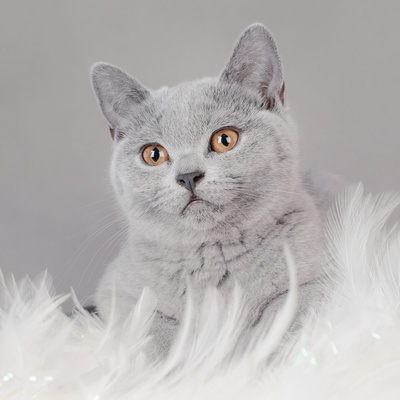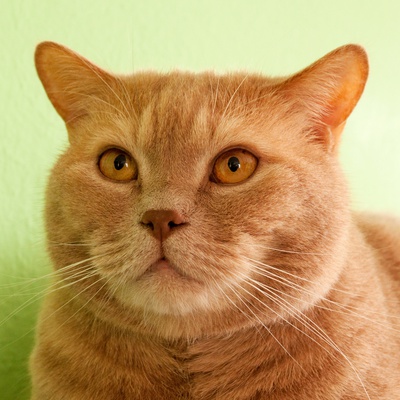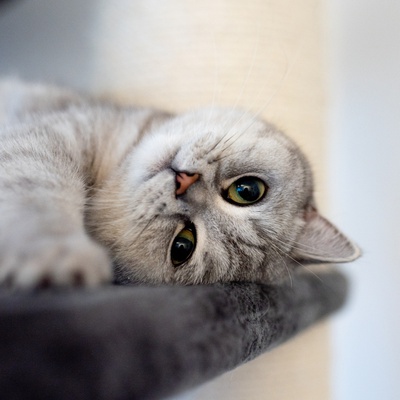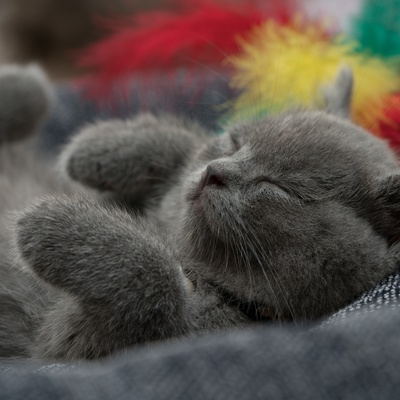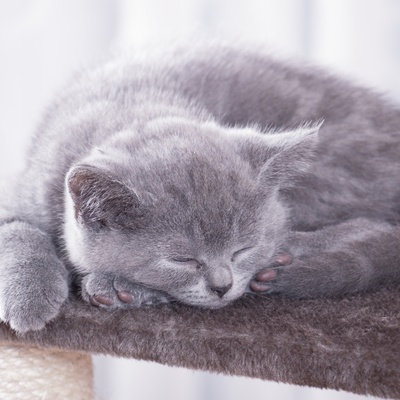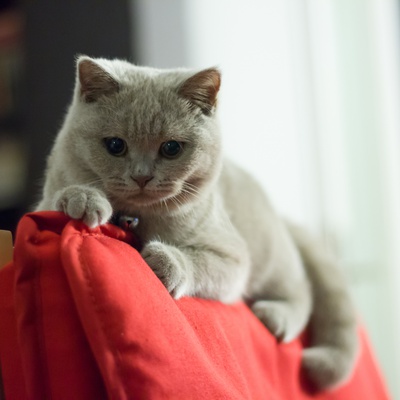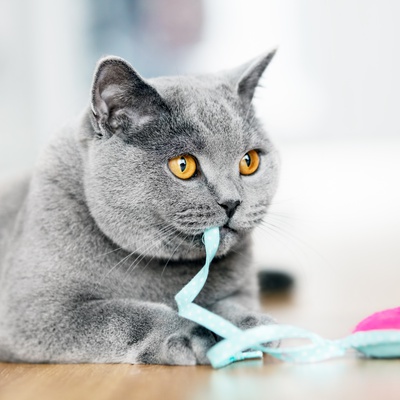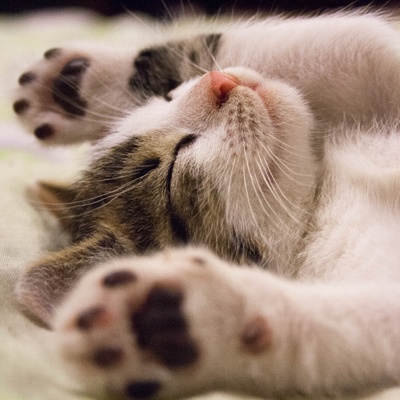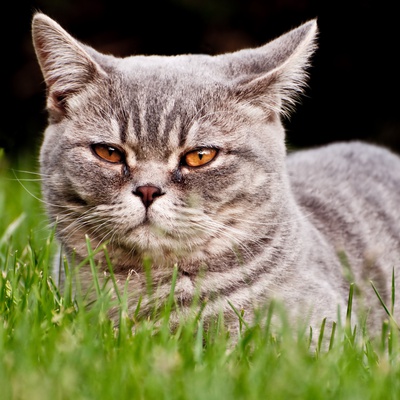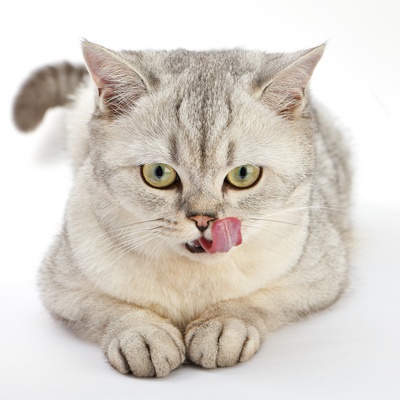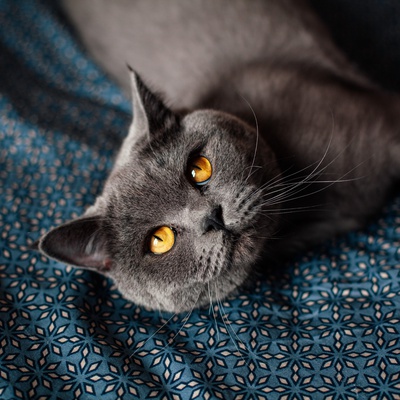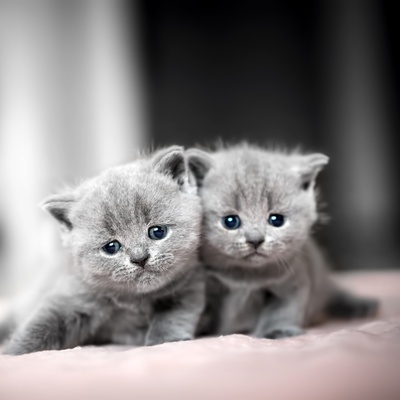Introducing the British Shorthair
Find out everything you need to know about the British Shorthair: its characteristics, its behaviour, its training and how much one costs.
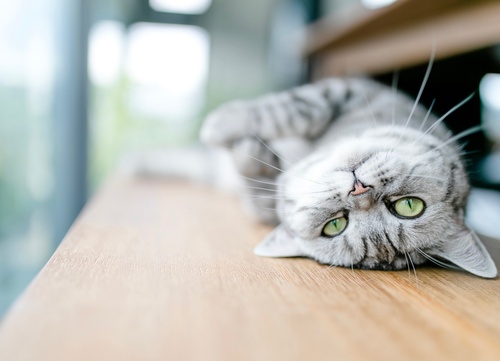
Find out everything you need to know about the British Shorthair: its characteristics, its behaviour, its training and how much one costs.
It’s all in the name! Breeding of the British Shorthair cat began in Great Britain in the 19th century. It is a cross between an ordinary domestic cat and a Persian. The British Shorthair is an elegant breed with a unique look. This adorable fluffy feline has a round head and eyes you can't help but fall in love with. It's a very popular cat well known for its sweet, gentle nature. The perfect pet.
This section outlines the unique features of the British Shorthair breed of cat.
The British Shorthair is a medium-sized, powerfully built cat. Typically, it is about 12 inches tall and weighs between 9 pounds and 17,5 pounds.
As the name suggests, the British Shorthair has a short, dense coat, giving it the look of your favourite teddy bear.
The British Shorthair is not a hypoallergenic breed. If you're allergic or sensitive to cats, another breed would be a better choice.
All colours and patterns are accepted for British Shorthair cats: solid, tabby, colourpoint, smoke, etc.
The British Shorthair will adapt to pretty much any environment. A safe and well supervised outdoor environment is a good idea for this freedom-loving cat.
British Shorthairs are sociable and friendly cats. They get on well with adults, children and other animals. They are not afraid of strangers.
The British Shorthair is generally very healthy! Like any cat, they are at risk of developing conditions like polycystic kidney disease (PKD) and hypertrophic cardiomyopathy (HCM).
The British Shorthair is an intelligent cat that listens to its owner. Its training should be based on communication, understanding and play!
We can help you!
Every cat has its own character and specific needs. Making the right choice will ensure his well-being and yours.
Thanks to our quiz, you'll know which breed is right for you, depending on your lifestyle, expectations and many other criteria.
Don't wait any longer and take the quiz to find out the answer!
The British Shorthair has a distinctive appearance. Its full, rounded body gives it the look of a real live soft toy.
The British Shorthair is a medium-sized cat. They are usually about 12 inches tall. Females are always lighter than males, weighing between 9 pounds and 13 pounds. Males can weigh up to 17,5 pounds.
British Shorthairs are slow growers. They don't reach their adult weight and size until they reach 3 to 5 years of age.
One of the key features of the British Shorthair is its coat length. As the name suggests, it does indeed have a very short coat. The fur is very dense and full, with a thick undercoat. This combination gives the British Shorthair an incredibly soft and silky coat.
All coat colours are acceptable for the British Shorthair. The fur can have a range of markings:
– Solid: black, dark grey, red, lilac, light beige, cream
– Tabby: striped
– Tortie: tricolour
– Colourpoint: one dominant colour with darker tips
In addition to these combinations, the British Shorthair coat can also be either smoke or golden.
The British Shorthair's coat is not particularly high maintenance. As with any cat, they need to be brushed regularly to keep their coat glossy and healthy. So, you should be brushing your British Shorthair 1 to 2 times a week.
When moulting, the British Shorthair sheds a lot more hair. You'll need to brush more frequently to get rid of all the dead hair and keep your cat comfortable, as well as stopping your cat from swallowing too much hair when grooming itself. Unlike the Savannah, the British Shorthair is not a hypoallergenic cat breed.
The British Shorthair is characterised by a powerful frame, well developed musculature and a fairly short body. It has a generally rounded shape all over. Its head is no exception and is large and rounded. Its cheeks are full, its nose short and rather small. Its eyes are large and round. Two broad ears, rounded at the tip, are set on top of its head. Its tail is short and thick.
The British Shorthair is one of the most beautiful breeds of cat, right up there with the Maine Coon and the Ragdoll.
Apart from regular brushing, the British Shorthair doesn’t require any special attention. If your furry friend goes outside on a regular basis, you could do with giving them a bath a couple of times a year. This will remove any bacteria, dead hair and dirt.
British Shorthairs have a relaxed, steady temperament. Understanding their temperament is key to making the most of these lovable balls of fluff.
British Shorthairs are sociable and extremely sweet. They get along with everyone and enjoy making new friends. They are not shy and love being around children. Living with other pets is a pleasure for these good-natured cats. They are very affectionate and demonstrative.
British Shorthairs are also independent and confident creatures who appreciate a little time to themselves. It’s all about balance with this breed!
The British Shorthair is not the most athletic breed of cat! They have a very laid-back temperament, a world away from the intense energy of the Bengal. In all honesty they prefer snuggling with their owner to leaping around all over the place. That’s not to say they’re lazy cats though. These clever creatures need regular stimulation to thrive and to maintain their balanced attitude to life.
The British Shorthair is a remarkably adaptable breed. They will adapt to living just about anywhere! Country house, flat or farm, they’re not fussy. They just need a calm, safe and cosy place to call home. If your British Shorthair is an indoor cat, you should make sure that it has space to play, relax and groom itself.
Despite its sweet, fluffy appearance and friendly nature, the British Shorthair is nonetheless a cat with a hunting instinct and a thirst for adventure. If you have a safe outdoor area, your cat will be happy to scamper about and explore every nook and cranny! If not, you can always walk them on a lead.
British Shorthairs aren't known for running away, but they do attract a lot of attention. You can fit them with a cat tracker to track their movements and find them if they run away or are stolen.
As you can see, the British Shorthair is an easy-going cat that anyone can own! You don’t need any special knowledge to train them well. It’s important to start them young though, especially with socialising your kitten. Although they are naturally friendly, their social skills do of course improve with training. This should be done with a gentle combination of love, understanding and patience.
They are intelligent, obedient and compliant cats. They want to please their owner and are quite happy to learn tricks.
Choosing a cat that matches your personality and lifestyle will ensure your well-being and his!
The British Shorthair is a pedigree cat. It is generally a healthy breed. It may develop some illnesses during its lifetime.
In general, the British Shorthair enjoys good health. They can suffer from hypertrophic cardiomyopathy, a thickening of the heart muscle. Over the course of their lives, they may develop kidney stones, which are very painful and can lead to polycystic kidney disease, where cysts form in the kidneys. Lastly, its big build can lead to joint pain.
British Shorthair cats have a life expectancy of between 15 and 20 years.
The British Shorthair needs regular veterinary check-ups, both for its routine care and to keep an eye on its general health. It's important to keep their vaccinations up to date to protect against common diseases like feline parvovirus and cat flu. Worming is also essential to keep your cat free of parasites in its stomach. If your British Shorthair is an indoor cat, you only need to worm them every 6 months. If they go outside regularly, every 3 months will offer better protection. Lastly, don't forget flea treatment and prevention.
At home you can look after your cat’s coat, ears, teeth and claws to prevent infections.
The British Shorthair is not a particularly active cat, plus its genetics means it has a tendency to be overweight. It needs a carefully controlled, balanced diet that meets all of its nutritional needs. The food should be high in protein and low in fat. This is why it's advisable to choose kibble and homemade food. Food is an integral part of your cat's training. It's important to teach them to eat at set times and in reasonable portions.
If their diet doesn't meet all their nutritional needs, you can supplement with vitamins.
Last but not least, to keep kidney stones at bay, the British Shorthair needs fresh water available at all times. You can top up your cat's diet with good quality wet food with a high water content.
The British Shorthair is the most popular pedigree cat in Britain. There are a few things to consider before getting one.
Munchkin cats, like other pedigree breeds, are often bred by professional breeders or catteries. But beware, there are some unscrupulous breeders out there who don't have the cats' best interests at heart.
You should also go and meet the breeders to see the cats’ living conditions and check they are healthy. Remember to check their certificate or other proof of pedigree and parentage. This will help you avoid unscrupulous breeders. It’s also important to check that all the necessary health checks and DNA tests have been carried out on the kitten and its parents so that you are aware of any hereditary health problems.
Lastly, mandatory electronic identification, like microchipping, is not always mandated at the federal level in the United States for cats and dogs. But microchipping is widely acknowledged as a successful way to permanently identify pets and increase the possibility of reuniting lost pets with their owners, even in the absence of universal regulations. As a pet owner, it is advised to inform yourself about municipal laws to ensure the safety and wellbeing of your pet.
The price of a British Shorthair can vary depending on several variables like age, pedigree, coat colour and location.
A British Shorthair kitten will usually cost you between
and
. Some breeders may charge a premium for purebred cats with distinguished pedigrees or rare coat colours.
On top of the purchase price, you should also factor in everyday living expenses, which are roughly
-
a year.
Choosing a cat that matches your personality and lifestyle will ensure your well-being and his!
